Mar 2019 2nd Edition
Mar 2019 2nd Edition vuyelwan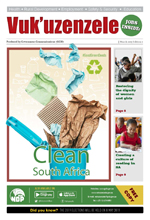
Translations
A clean environment is a money spinner in Ga-Rankuwa
A clean environment is a money spinner in Ga-Rankuwa vuyelwanA clean environment is not only great for the future, but can be a money spinner in the present with waste management having an estimated market value of R15 billion.
The business of waste picking is helping feed families across the country. Ga-Rankuwa resident Godfrey Motshwane says he picks waste as a way of earning money for himself.
The waste picker sells his waste at Eco Care, a waste management company in Ga-Rankuwa.
Motshwane says he makes about R120 per day from collecting waste.
He collects waste in the form of plastic and cardboard. “I sell about four times a day to Eco Care. The material I collect is plastic and cardboard,” he said.
The waste he collects helps to keep his township clean from litter, he says the neighbourhood appreciates his services. “When I collect the waste from people’s yards they are happy and welcoming as I am cleaning up for them at no cost to them,” he said.
Owner of Eco Care Waste Management, Lerato Makube, said the buyback centre buys the waste from waste collectors.
Those selling waste at the centre are paid based on the size of the waste they collect.
She said the community in the area had become more aware of the need to recycle. “The business has had a developmental impact on this community. People who did not know about waste collection have started collecting waste," said Makube.
She said her business not only employs 11 permanent employees but has sparked a curiosity in the community about recycling.
“There is always going to be waste and people need to start viewing waste as a commodity,”Makube told Vuk’uzenzele.
Her business has been in the township since 2018.
“I got into this business because of the opportunity to green our community. We collect solid waste material for recycling which otherwise would have ended up in the landfill sites,” she said. Makube's business is in line with government’s plan to divert waste away from landfills.
The business has begun teaching its waste pickers on how to separate the different waste categories. “ People seeing waste as a resource,” she said.
Good Green Deeds
Meanwhile, President Cyril Ramaphosa has launched the Good Green Deeds programme with a special focus on the importance of a clean environment.
Research conducted by the Department of Envirnomental Affairs in 2017, found that at least 75 percent of South Africa’s waste is being landfilled and minimal waste is managed through the reduce, reuse, recycle and recovery plan.
As part of teaching and advocating the importance of a clean environment, government is encouraging for South Africans to take part in the Good Green Deeds programme, by keeping their communities clean.
Artisan academy to provide skills in the Free State
Artisan academy to provide skills in the Free State LondekileGovernment has invested R500 million into the establishment of the National Artisan Development Academy. The academy aims to address unemployment in the country.
Housed within Motheo Technical and Vocational Education and Training (TVET) College in Bloemfontein, Free State, the academy aims to make a contribution towards meeting the country’s target of producing 30 000 artisans a year by 2030.
The academy also seeks to solve the challenge of youth unemployment by providing scarce artisan skills.
Motheo TVET College Principal, Professor Dipiloane Phutsisi, said the academy is aimed at assisting the country in providing scarce and critical skills that were identified by research that was conducted by the University of the Free State.
“The National Artisan Development Academy will assist in supplying South Africa with goldsmiths. We also want to produce artisans in the haircare industry. Haircare and beauty will form part of the occupational programmes to be offered at the centre.
“We also took seven trades in the building industry from bricklaying, plastering, tiling, flooring … to be part of the occupations there. We are also going to offer [training in] renewable energy,” Phutsisi said.
She said Motheo TVET College is among seven colleges in the country that the Department of Higher Education and Training in partnership with the German Government identified to offer courses in renewable energy which include a programme in building and installing of solar panels.
Other programmes that will be offered at the academy include real estate, electrician and boilermaker training, as well as carpentry, jewellery manufacturing and funeral services.
“We are going to train people to provide professional funeral services. The college currently offers upholstery and furniture making. We are going to utilise those skills to build coffins. Communities will be able to buy the coffins at a very reasonable price,” Phutsisi said.
The academy, which is at about 90 percent completion, is expected to be operational in June. The Services Sector Education and Training Authority (SETA) recently undertook a site visit at the academy.
Services SETA CEO Amanda Buzo-Gqoboka said the Motheo TVET College is the custodian of the concept of the academy and the Services SETA are the funders of the academy.
“This project has created a total of 2 005 contractors' jobs from the area,” she said.
SANews.gov.za
Bipolar… how can you help?
Bipolar… how can you help? vuyelwanIf someone you love has been diagnosed with a bipolar disorder there are various things that you can do to help and support them.
Do research, learn everything there is to know about the specific bipolar disorder that your loved one has been diagnosed with. Find out about its causes, symptoms and treatments, and speak to the patient’s doctor if possible.
Recognise the warning signs
You should also learn about the warning signs of manic and low episodes, so that you know how a person may act.
According to a bipolar guide produced by the SADAG it is a good idea to plan, while the person is well, how you should respond when you see that they are experiencing bipolar symptoms. For example, you can discuss and set rules that may involve safeguards such as withholding credit cards, banking privileges and car keys. 
“Encourage the patient to stick with treatment, visit their doctor and avoid alcohol and drugs, as these can trigger bipolar syptoms or make the mood disorder worse,” says Dr Eddie Pak, a psychiatrist based at the Gauteng Department of Health’s Sterkfontein Psychiatric Hospital.
If the patient has been on a certain treatment for an extended period of time, with little improvement in symptoms, or has troubling side effects, encourage the person to ask the doctor
about other treatments or to get a second opinion.
Treat people normally once they have recovered, but be alert for symptoms.
Suicide warnings
It is very important to be aware of the warning signs of suicide and to take any threats that the person makes seriously.
If the person is ìwinding upî his or her affairs, talking about suicide, frequently discussing methods of follow-through or exhibiting increased feelings of despair, it is time to step in and seek help from the patientís doctor or family members and friends.
Get help
If you or someone you know needs help, visit your closest mental health facility, clinic, hospital or doctor. You can also contact the Cipla 24-hour mental health helpline at 0800 456 789, the SADAG helpline at 011 234 4837, the Suicide Crisis Line at 0800 567 567 or the 24-hour Akeso Psychiatric Response Unit at 0861 435 787.
CPF makes Lenasia’s streets safe
CPF makes Lenasia’s streets safe UrsulaThe Lenasia Community Policing Forum (CPF) was recently awarded for being the best CPF in Gauteng.
The crime fighters’ dedication has ensured a drop in crime in Lenasia Extensions 1 to 13, Thembelihle and Waterworks.
The Lenasia CPF’s chairperson Ebrahim Asvat said it has successfully combatted crimes such as robberies and hijackings in these areas, where the 540 member-strong team maintains vigilance at all times.
“We have successfully dropped the number of hijackings in the area,” he said.
The CPF does more than just patrol. Asvat said it runs several awareness campaigns, especially on what community members should do when they are aware of domestic abuse. “We have a victim empowerment centre. We also offer counselling and support activities in the community,” he said.
The CPF is also tackling gender-based violence crimes such as rape.
“We are aware of women who went to the shebeen and were raped when they left. We started awareness campaigns at shebeens and drinking houses, where we tell women that they shouldn’t be alone, but should rather stay in groups or make sure that someone stays with them,” said Asvat.
He added that there had been a 30 to 40 percent drop in overall crimes committed in the Lenasia CBD. The CPF, which acts as the police’s eyes and ears in the community, says it reports crimes to the police when they happen.
The CPF’s slogan is partners in policing. “We have a very good relationship with the police. At a crime scene, we just secure the scene and let the police do their work and they make the arrests,” he said.
Clean South Africa
Clean South Africa vuyelwanCreating a culture of reading in SA
Creating a culture of reading in SA UrsulaReading to your children regularly will inspire them to want to read, and help them establish a satisfying, lifelong relationship with books and reading.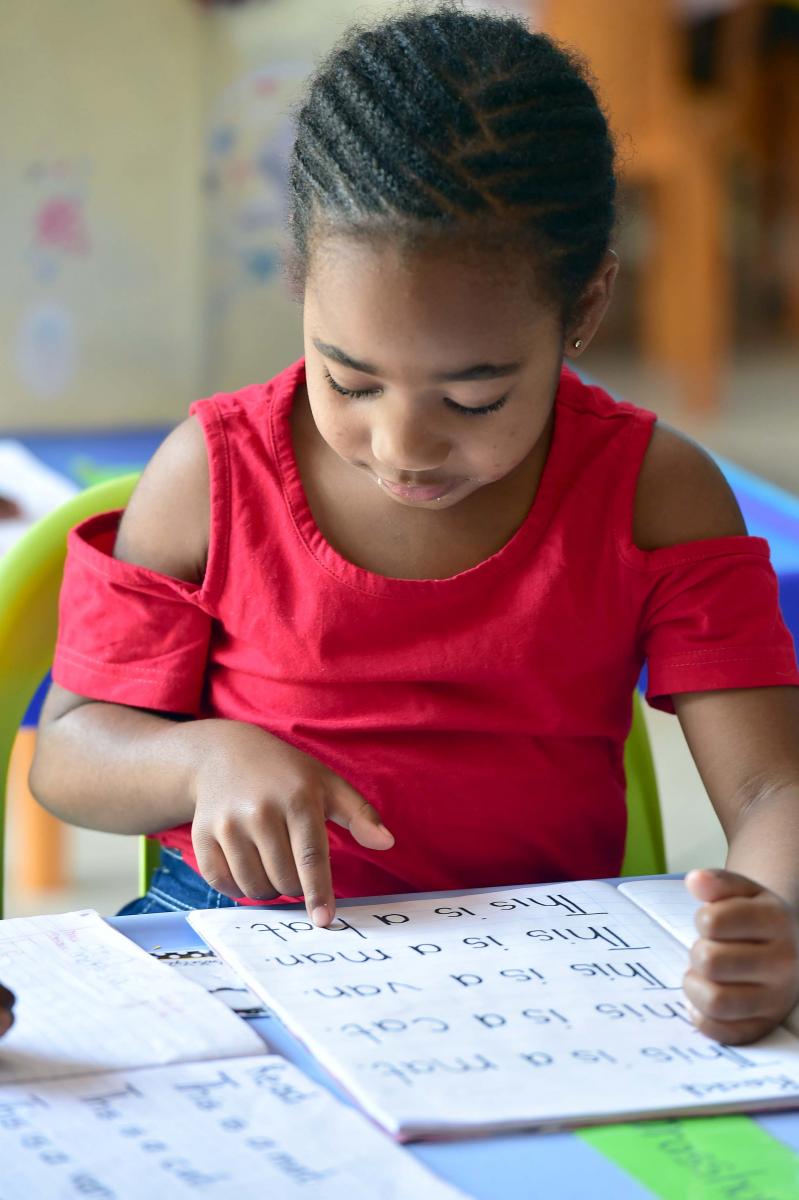
Literacy is a strong indicator of future success. Children who read regularly perform better at school than those who do not, with research reinforcing the link between reading for pleasure and improved academic results.
However, the results of the 2016 Progress in International Reading Literacy Study placed South Africa last out of 50 participating countries. The study revealed that 78 percent of Grade 4 children in South Africa cannot read for meaning in any language.
A well-established culture of reading could be a real game-changer for education in South Africa, said Nal’ibali spokesperson Sally du Preez.
“Children who regularly read and hear engaging stories, in languages they understand, are well equipped and motivated to learn to read and write.”
Nal’ibali is a national reading-for-enjoyment campaign aimed at sparking children’s potential through reading and story-telling. It publishes and distributes newspaper supplements, books, story collections and magazines, runs reading clubs, and trains communities across the country to encourage the habit of reading and writing in children.
Tips to nurture a love of reading at home, in the classroom and within the community:
- Enjoy yourself when reading to your children. If you do, they will learn that reading is a pleasurable activity;
- Share stories when your children find it easy to settle down, like after bath time or just before they go to sleep at night;
- Younger children or children who are tired often find it difficult to concentrate for long periods of time, so do not read for too long;
- Find a quiet, comfortable place to read. Turn off any computers, TVs and radios;
- Read with as much expression as you can − your children will appreciate it!
- Find ways to draw them into the story as you read. For example, ask them what they think might happen next, discuss one of the pictures or ask them to turn the pages for you;
- Once your children can read, do not stop reading to them! Choose books that are more difficult and complex than the ones they can read on their own.
For more information about Nal’ibali, or to access children’s stories in a range of South African languages, visit; www.nalibali.org and www.nalibali.mobi.
Creative sector set to benefit from 4IR
Creative sector set to benefit from 4IR UrsulaThe technological revolution must improve and advance the lives of South Africans.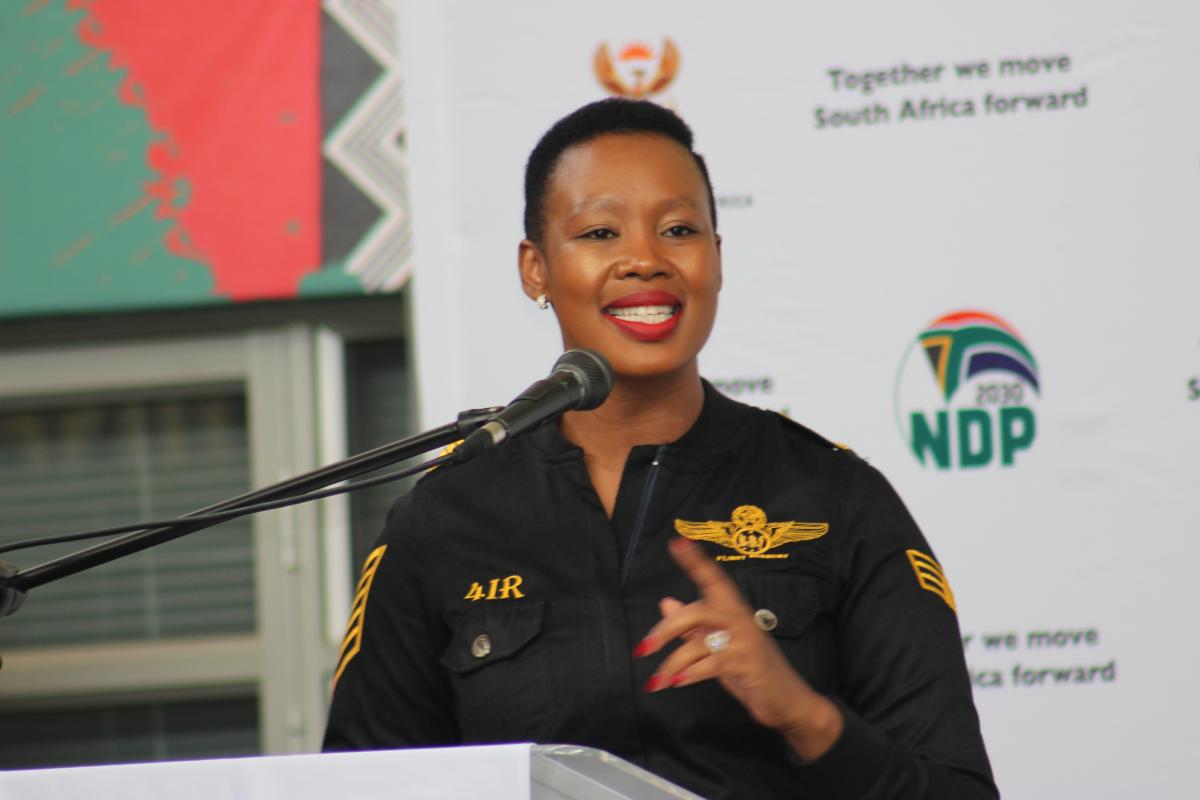
There seems to be light at the end of the tunnel for small film-makers, broadcasters and people involved in the creative space who embrace the opportunities of the Fourth Industrial Revolution (4IR).
The 4IR can be described as the rise of the technological age, and will provide developing and emerging economies like South Africa, an opportunity to advance the application of science and innovation.
With the country propelling itself into the digital age, the Minister of Communications, Telecommunications and Postal Services, Stella Ndabeni-Abrahams recently met with members of the creative industry in Johannesburg.
The one-day engagement, under the theme ‘Leveraging on digital platforms for 4IR creatives’, focused on broadcasting, audio-visual and new platforms, as well as 4IR.
Topping the agenda was how job creation and income generation from 4IR technologies can become a reality.
Minister Ndabeni-Abrahams called on those in the industry to work with the department in making 4IR a key factor in how creatives do business.
“Please walk this path with us so that as we are developing policies for 4IR, we are able to move from an informed view,” she said.
The Minister was accompanied by her deputy, Pinky Kekana, and the Minister of Small Business Development, Lindiwe Zulu.
Lungisani Mthethwa, a film-maker, said young people want to build rather than just consume products. “We are sick and tired of being consumers; we want to be identified as the manufacturers,” said Mthethwa.
Minister Zulu responded by explaining that the South African Creative Industry Incubator and Media Incubator have been identified as core drivers to pioneer the commercialisation of technology.
The SA Creative Industry Incubator is a creative hub providing technical skills training, business and arts incubation.
“Incubators must focus on creating a new generation of start-ups that will drive the creation of disruptive industries at its core,” said Minister Zulu.
For more information about the South Africa Creative Industries Incubator, call 012 806 4126 or log on to https://sa-creative-industries-incubator.co.za/
Do you know what your children are watching?
Do you know what your children are watching? tsoanaSports, Arts & Culture
The Film and Publication Board (FPB) has urged parents to be vigilant and to closely monitor their children’s online activities, especially games downloaded on various App stores or from other online sources.
The board in a statement said it had been alerted of a mobile game called “Momo Challenge”,which it describes as a form of cyberbullying targeting young children. It encourages self-har m and may even lead to suicide, the FPB said.
m and may even lead to suicide, the FPB said.
The “Momo Challenge” appears as a scary image on online platforms with requests for the user to contact “Momo” on WhatsApp through one of several contact numbers. Reports claim that the character instructs children to complete challenges that they must keep secret or “Momo” will kill them.
FPB’s Acting Chief Executive Officer Maria Motebang said in the statement: “Our FPB online monitors conducted a search on legitimate and known App stores and were unable to find reference to the game. However, there is a possibility that the game may be shared on a peer-to-peer basis”.
The FPB nevertheless urged parents to take note of a few tips. These include: Download monitoring Apps on your device. These Apps monitor your child’s online activities and can be set to:
- Alert you when your child logs on to an App.
- Allow you to set limits of how much time they can spend online using their devices.
- Alert you when the child tries to download an App.
- Allow you to grant permission for your child to download an App.
- Always supervise your children when they are online and get to know the games they play or videos they access on platforms such as YouTube
- Be aware that the internet does not only offer fun activities,there are also criminal activities.
- Teach children not to share personal information and to ensure their privacy settings are always on.
- Assist them to identify activities or people that make them feel uncomfortable and to report such activities immediately to their parents.
- Teach children to block any person who bullies them and to report to an adult.
- Ensure that the devices they have access to are restricted to age suitable content.
- Many social networks require users to be 13 years or older. If your children have social media accounts, ensure that you check their privacy settings and who they interact with.
The FPB urged parents and guardians to monitor their children’s devices and report any suspicious content on the FPB hotline number 0800 148 148 or www.fpbhotline.org.za.
EC government eases the effects of drought on farmers
EC government eases the effects of drought on farmers LondekileFarmers in the Joe Gqabi District in the Eastern Cape have welcomed the provincial government’s efforts to help them deal with the effects of the recent drought through the feedlots programme.
A feedlot is a type of animal feeding operation which is used in intensive animal farming for livestock prior to slaughter.
The provincial Rural Development and Agrarian Reform (DRDAR) MEC Xolile Nqatha recently launched a feedlot to the tune of R2.7-million in the Walter Sisulu Municipality, as part of the agriculture economic transformation strategy. The strategy seeks to commercialise agriculture in the province.
The feedlot has a capacity to accommodate 300 cattle at a time and is one of the 12 feedlots currently operational in the province. The department has also partnered with the National Agricultural Marketing Council (NAMC) and local municipalities to improve the quality of livestock in the province.
Communal farmers have the ability to take their livestock to the DRDAR-funded feedlots for fattening over a period of 120 days for a standard fee of about R900. Once the cattle are ready for commercial markets they are sold to abattoirs or private buyers, yielding more profits for farmers.
Chairperson of Walter Sisulu Secondary Co-op, which is managing the feedlot, Nopice Sefatsa, said the feedlot wouldl bring much-needed relief.
“We need to create our own fodder banks as feedlots because that will mitigate the drought conditions. We are thankful to the department for this infrastructure and we want to commit ourselves that we will never let this be a white elephant,” Sefatsa said.
Speaking at the launch, MEC Nqatha said; “Government is committed to ensuring emerging farmers are developed to become fully fledged commercial farmers because we cannot have emerging farmers forever. By constructing this feedlot, we want to change the economic landscape of this district. We want farmers to form a movement to fight against poverty and inequality, a movement that will ensure economic transformation.”
This financial year, DRDAR has invested R16.5 million to increase the number of feedlots across the province.
The department is supporting 11 rural custom feedlots that target communal farmers which are in the Chris Hani, Amathole and the OR Tambo districts.
MEC Nqatha also said government was aware of the extent of the drought and how this was affecting farmers in Joe Gqabi and other districts.
Everything you need to know about the minimum wage
Everything you need to know about the minimum wage LondekileEvery working South African has the right to a fair salary to support themselves and their families.
With the National Minimum Wage (NMW) officially passed into law by President Cyril Ramaphosa at the beginning of this year, this right is now officially protected.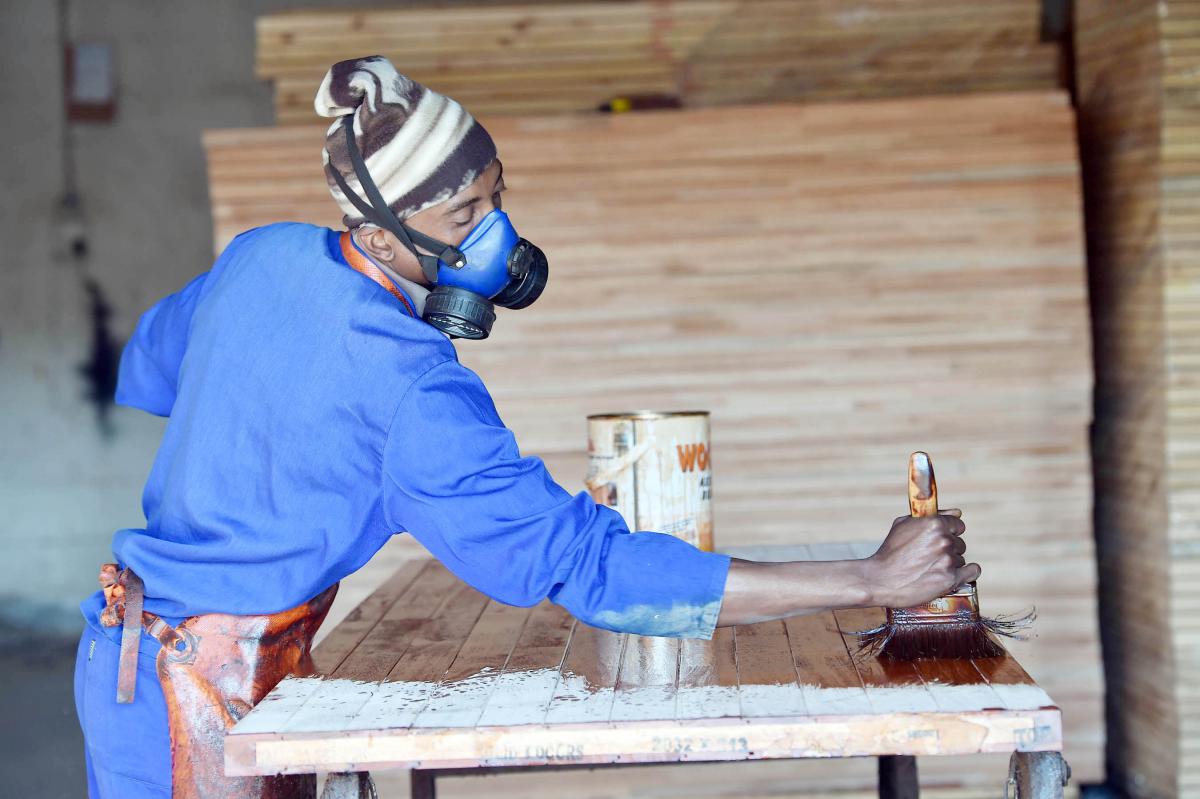
The Minister of Labour, Mildred Oliphant, said the NMW would not replace the minimum wages that had already been agreed to through the collective bargaining agreements.
“The minimum wage will benefit particularly those who are still earning far less than the proposed R20 an hour. A sector that will benefit immensely is the hospitality industry, where you find that workers are often only earning through tips,” she said.
Your rights under the NMW Act of 2018:
Under the NMW, workers in most sectors must be paid no less than R20 per hour of work.
This excludes farm workers, who must be paid at least R18 per hour, domestic workers (R15 per hour) and EPWP workers (R11 per hour).
You must be paid at least the minimum wage for every hour that you work. If you work for less than four hours on a day, you must still be paid for a full four hours.
How much should you be earning per month?
If you are earning R20 per hour and work for eight hours per day for five days of the week, then you should be paid R800 per week. In a month, your employer must pay you R3 466.40.
If you are earning R20 per hour and work for nine hours per day for five days of the week, then you should be paid R900 per week. You should be paid R3 899.70 per month.
If you are a farm worker earning R18 per hour and working 40 hours per week, then you need to be paid R3 119.76 per month. If you are working 45 hours per week, then you should be paid R3 509.73.
If you are a domestic worker earning R15 per hour and working 40 hours per week, then you should be paid
R2 599.80 per month. For 45 hours, you should be paid R2 922.75.
What happens if you are paid less than the minimum wage?
Complaints can be made at the nearest Department of Labour office, or can be referred directly to the Commission for Conciliation, Mediation and Arbitration (CCMA). The CCMA has opened two phone numbers for receiving enquiries: 011 377 6627 and 011 377 6625.
Girls empowered with sanitary towels
Girls empowered with sanitary towels tsoanaThe Eastern Cape Development Corporation has helped a social warrior fund the packagingand marketing of her affordable sanitary towel.
Babalwa Mbuku’s mission to empower the poor has given rise to a sanitary towel brand called Ntombam, which means ‘my daughter. 
The bubbly 39-year old, who is a 2019 ambassador for Brand SA, hopes to open her own manufacturing facility in East London. She explained that through her NPO Operation Feed-a-Child, she noticed that many girls miss school when menstruating because they do not have sanitary wear.
“I visited a lot of schools in the province and I did research which showed that some girls used newspapers, some pieces of cloth and some even went as far as using soil or cow dung wrapped in cloth or aloe leaves. When I went to Lusikisiki, I found that they did not even have panties so they did not go to school when they had their periods.
“Others buy cheap pads which leak because they are of poor quality. Some are scented and children get allergic reactions. I decided to intervene,” said Mbuku.
She designed sanitary towels with the health and confidence of the girls in mind. “Some kids start their period very young, for example at nine years of age. I had to make sure they would still be able to play while on their period without worrying about leaks.”
Sadly, Mbuku found there are many misconceptions about menstruation.
“Girls are told that they are unclean and must not prepare food for others because it’s bad luck, hence some even have depression. I decided to became a menstrual coach to demystify menstruation and I include boys because when
girls leak, the boys laugh at them and some get so embarrassed they never go back to school.”
Mbuku has also written a motivational book called ‘Rise Ntombam because you can, to highlight how she rose time and again from setbacks.
Jobs: Department of Labour - Mar 2019
Jobs: Department of Labour - Mar 2019 tsoanaDeputy Director: SAP Application Maintenance and Support
Centre: Chief Directorate: CIO
Reference No: HR 4/19/03/1HO
Salary: All inclusive: R 697 011 per annum
Enquiries: Ms. E Cronje, Tel: (021) 309 4876
Head Office: Human Resources Management: Private Bag X 117, Pretoria, 0001
Assistant Director: Risk Management
Centre: Provincial Office: KwaZulu-Natal
Reference No: HR 4/4/5/21
Salary: Commencing: R 356 289 per annum
Enquiries: Mr. WS Mpanza, Tel: (031) 366 2186
Provincial Office: Chief Director: Provincial Operations: P O Box 940, Durban, 4000
Principal Psychologist
Centre: Provincial Office: Kimberly
Reference No: HR 4/4/8/371
Salary: Commencing: R 974 634 per annum (OSD)
Enquiries: Mr. A Senakhomo, Tel: (053) 838 1545
Provincial Office: Chief Director: Provincial Operations: Private Bag X 5012. Kimberly, 8301
Assistant Director: Work-Seeker Registration Co-ordinator
Centre: Provincial Office: KwaZulu-Natal
Reference No: HR 4/4/5/19
Salary: Commencing: R 444 693 per annum
Enquiries: Mr. ZP Dlamini, Tel: (031) 366 2010
Provincial Office: Chief Director: Provincial Operations: P O Box 940, Durban, 4000
Closing date for applications: 01 April 2019 For full details of the advertised posts visit our website: www.labour.gov.za
Applications must be submitted on form Z83, obtainable from any Public Service Department or on the internet at www.gov.za/documents. The fully completed and signed form Z83 should be accompanied by a recently updated, comprehensive CV as well as recently certified copies of all qualification(s) including a Senior Certificate and ID-document [Driver’s license where applicable]. Non-RSA Citizens/Permanent Resident Permit Holders must attach a copy of their Permanent Residence Permits to their applications. Should you be in possession of a foreign qualification, it must be accompanied by an evaluation certificate from the South African Qualification Authority (SAQA). Applicants who do not comply with the above-mentioned requirements, as well as applications received late, will not be considered. The Department does not accept applications via fax or email. Failure to submit all the requested documents will result in the application not being considered. Correspondence will be limited to short-listed candidates only. If you have not been contacted within eight (8) weeks after the closing date of this advertisement, please accept that your application was unsuccessful. Suitable candidates will be subjected to a personnel suitability check (criminal record, citizenship, credit record checks, qualification verification and employment verification). Where applicable, candidates will be subjected to a skills/knowledge test. All shortlisted candidates for SMS posts will be subjected to a technical competency exercise that intends to test relevant technical elements of the job, the logistics of which be communicated by the Department. Following the interview and technical exercise, the selection panel will recommend candidates to attend generic managerial competencies using the mandated DPSA SMS competency assessment tools. Successful candidates will be appointed on a probation period of 12 months. The Department reserves the right not to make any appointment(s) to the above post. The successful candidate will be expected to sign a performance agreement. The Department of Labour is an equal opportunity affirmative action employer. The employment decision shall be informed by the Employment Equity Plan of the Department. It is the Department’s intention to promote equity (race, gender and disability) through the filling of this post(s) with a candidate whose transfer / promotion / appointment will promote representativity in line with the numerical targets as contained in our Employment Equity Plan.
Minimum wage, a victory for workers
Minimum wage, a victory for workers LondekileThe long-awaited NMW is making a difference and having a positive impact on people’s lives.
The NMW of R20 per hour or R3 500 per month, which came into effect on 1 January, will protect vulnerable workers from exploitation.
 Proclaimed by President Cyril Ramaphosa in November 2018, the minimum wage has received the nod from the Congress of South African Trade Unions as the first step towards a living wage for about 6.4 million workers in the retail, security and cleaning services sectors.
Proclaimed by President Cyril Ramaphosa in November 2018, the minimum wage has received the nod from the Congress of South African Trade Unions as the first step towards a living wage for about 6.4 million workers in the retail, security and cleaning services sectors.
While this is great news for most workers, East London security guard Zolile Binta said they had to go on a strike to get confirmation that they would get the R20 per hour wage.
“We are going to get it [the minimum wage] this month for the first time. From 2010 to January this year, we got R11 per hour. We work in a risky industry and we need more than R20 per hour.
“I have seven children, the youngest is 17. Our children can’t find work and my wife is a housewife. Even the minimum wage is not enough. However, it will make some difference because previously we received between R1 500 and R2 000,” said Binta.
Another security guard Nombeko Zenani said the minimum wage would make a big difference in her life and would protect workers from exploitation.
The local organiser of the Democratic Transport Logistic Allied Workers Union, Melumzi Ndongeni, said although the minimum wage would make a difference in many worker’s lives, some employers were finding a way to get around it by reducing the number of hours they work per shift.
“It will make a difference, but there are still some issues that need to be ironed out. Yes, the minimum wage was signed into law, but very few companies comply. Some businesses that have been paying over R25 per hour for instance, reduced the rate to R20 per hour, claiming they are struggling. There is nothing that can be done about it because they are compliant,” said Ndongeni.
My country, my responsibility
My country, my responsibility vuyelwan
Since taking office in 2018, I have consistently invited and challenged all South Africans to build a prosperous country that we can all be proud of.
One of the best ways to enable all of us to become active citizens is to be the change that we want to see in our country and communities. Broadly speaking, if I want to live in a safer country, I cannot take part in or keep quiet about criminal activities taking place in my community.
If I want to live in a community where my mother, sister and daughter feel safe and protected, my role as a man should be to protect women and children from the brutality of violence and abuse. If I am aware of women and children who are being abused in my community, it is my duty as an active and responsible citizen to report the abuse to authorities such as social workers and police.
The scourge of women and children abuse is on the rise in our country, and it is up to all of us to put a stop to it as it has no place in our society. As active citizens we should unite and say enough is enough! Women and children have the right to live free of fear and abuse.
Active citizens are agents of change and take charge of their future and that of their communities. In building a better future for our country, let us also be active in the school life and development of our children.
If you are a parent or guardian, spend time reading to your son or daughter to help them to develop a love of reading and to also read with understanding. It takes practice, time and patience to develop reading comprehension skills.
In 2017, the Progress in International Reading Literacy Study released a report about the poor literacy levels in South Africa. The report found that 78 percent of grade four learners are unable to read for meaning. This means that nearly eight out of 10 of Grade Four learners cannot read for meaning.
It is up to us as parents and guardians to change this. You can start by setting aside 30 minutes a day to read aloud with/to children to raise their literacy levels.
Reading is empowering because it develops strong mental abilities and is the most fundamental skill that any person needs to achieve their potential.
As we celebrate Human Rights Month, it is worth a reminder that the Constitution of the Republic of South Africa of 1996 guarantees the right of all South Africans to live in an environment that is not harmful to their health and well-being.
Littering, illegal dumping, pollution and other harmful activities have a negative effect on the natural environment. I recently launched the Good Green Deeds campaign to encourage all South Africans – the private sector, labour, non-governmental organisations, interfaith formations and society at large – to clean South Africa.
Creating a clean environment is not only the responsibility of government but of all of us. We are all responsible for the environment that we live, work and find leisure in.
A clean environment begins with you and me, so do not litter; pick up litter and throw it in the dustbin; and reduce, reuse and recycle to help cut down on waste.
Reduce the amount of travelling you do by car to save fuel and protect the environment from carbon emissions, and also opt for fresh foods instead of pre-packaged foods to ensure good health. You can also reuse shopping bags instead of buying plastic bags every time you shop.
Recycling, on the other hand, is the process of converting used items back into a reusable material and then using this to make new products. Recycling conserves natural resources and reduces the need to put waste into landfills. You can recycle paper, glass and cans, as well as certain kinds of plastic and metal.
Our nation brand rests on each citizen and collectively on the sectors of government, business and civil society.
Our achievements and ability to address socio-economic and political challenges in the past confirm that we can work together as a united nation to build a country that does not abuse women and children, but which among other things, takes a keen interest in the literacy of our children and promotes a clean and safe environment.
When we feel this common sense of destiny, we begin to take ownership of the country that we want to live in.
We cannot be spectators in the development and management of our beautiful country.
It all begins with you and me.
New ablution facilities handed to KZN school
New ablution facilities handed to KZN school LondekilePupils of Ubuhle Bemvelo Primary School in Mtubatuba, KwaZulu-Natal will now be using safe new toilets thanks to a partnership between government and the private sector.
The 48 toilets were donated by Amalooloo, a private company, after a call made by President Cyril Ramaphosa for business to work with government in eradicating unsafe toilets.
Principal of Ubuhle Bemvelo Primary School Oscar Sithole, said they were grateful for the toilets as they ensured that pupils would be safe. He said the toilets will protect pupils from contracting illnesses.
“Having proper toilets in our school is a reflection of transformation. The school has been without proper ablution facilities for a long time,” said Sithole.
Of the 48 toilets, six were especially designed to be used by Grade R pupils.
“There are extra toilets for Grade R. There were initially 42 toilets but they have given us an additional six,” he said.
The handover of the toilets was done at the launch of the roll out of Sanitation Appropriate for Education Initiative (SAFE) by the Minister of Basic Education Angie Motshekga.
The SAFE initiative has seen the construction of 787 safe and grade-appropriate sanitation facilities, with a further 841 schools either in planning, design or construction stages across schools in the country.
Ubuhle Bemvelo Primary is the first school in KwaZulu-Natal to receive toilets as part of the SAFE programme.
“Studies show that proper sanitation and good hygiene practices increase learner participation in class while reducing absenteeism due to illnesses such as diarrhea and pneumonia,” Minister Motshekga said.
The minister said the initiative seeks to deliver ablution facilities speedily by working with private sector companies.
Did you know?
Through the Accelerated Schools Infrastructure Delivery Initiative (ASIDI) about 226 sanitation projects and 21 inappropriate structures have reached completion.
New maritime school for Gauteng
New maritime school for Gauteng LondekileSchools of specialisation will help Gauteng produce the skills necessary for the high-tech era in which we live in.
Soweto’s Mohloli Maritime School of Specialisation (SoS) is the first inland school to offer maritime studies.
Principal Nokwanda Mtayise said Mohloli which is situated in Sharpville is a maths, science and ICT school of specialisation with a maritime focus. It is the school’s performances in maths and science that resulted in it being converted to a SoS. Mohloli has routinely achieved a matric pass rate of over 90 percent and a 100 percent pass rate in mathematics.
“The awarding of the maritime status to our school is a privilege as the school is in a township. As a township school, we have been performing very well in the fields of maths and science. We have done so for a number of years and consistently so, to a point where our matriculants were obtaining 100 percent passes in maths, closely followed by science,” Mtayise said.
Nautical sciences, maritime economics and coding and robotics have been introduced as new subjects.
Successful pupils will not only receive a matric certificate when they graduate, but also a trade certificate.
Mtayise said: “This opportunity gives them a broader career path. Pupils in the past would only study the more common subjects whereas this gives them a wider career scope,”
The 1 267-pupil school has introduced maritime studies to its Grade 8 and 9 classes, with a planned full implementation by 2020.
“The economics part will allow for the development of entrepreneurship skills. By the time they finish, they will have certificates in swimming, engineering and economics,” said Mtayise.
At the opening of the school recently, Gauteng Department of Education spokesperson, Steve Mabona, said the school is one of 35 in the province to be converted into a SoS.
“The department intends to launch SoSs in each of the five corridors in Gauteng, responding to the skills needs in the region, the province and the country.”
SoSs offer a highly specialised curriculum and seek to nurture the development of top talent in South Africa across key disciplines.
Northern Cape tourism set to get a boost
Northern Cape tourism set to get a boost tsoanaSports, Arts & Culture
Communities in the Northern Cape towns will get a welcome boost from a new tourism route that explores the rich history, culture, art and natural heritage of a little-known region.
Named after the bushman’s hat plant that grows in the Kalahari, the Go Ghaap! Route connects the small towns of Kuruman, Kathu, Deben, Olifantshoek, Postmasburg, Danielskuil, Griquatown, Barkley West and Campbell.
“The route provides a rich experience of culture, history, ancient architecture, local culture, food, art and heritage,” said Northern Cape Tourism Authority CEO Sharron Lewis.
Tourists on the route can explore an early geological history stretching back three billion years, and can also take a tour of the incredible Wonderwerk Caves.
Mary Moffat Museum in Griquatown
Meanwhile, another history can be explored at the Mary Moffat Museum in Griquatown and the Moffat Mission in Kuruman. This area was the site of various battles during the Anglo-Boer War.
It is hoped that the new route will attract tourism to the province and provide much-needed income for a variety of businesses in the area, as well as create new jobs.
Mpho Cornelius, the founder and director of The Workshop ko Kasi, an ecotourism, crafts and food establishment in Kuruman, says she is delighted that her region is finally getting a tourism route.
“We were the only region in the Northern Cape that didn’t have a tourism route. So this has meant that the tourism numbers have been down,” says Cornelius, who was actively involved in discussions about establishing the route.
Cornelius says that being part of a recognised route will give local businesses the boost they need. “The Northern Cape is so large that tourists don’t find it easy to travel from one place to another. Establishing a route like this gives people an idea of where to go. Being part of the route means that hidden gems such as us can literally put us on the map, make products accessible and create employment,” says Cornelius.
The Go Ghaap! Route has various local craft producers and other establishments identified along the route.
“Many crafters in the Ghaap region make fine products, but they do not reach their potential markets, whether wholesalers, retailers or consumers. We hope that our project will address this market failure between clients and crafters.”
Provinces respond to President’s call for action
Provinces respond to President’s call for action UrsulaSouth Africa’s nine provinces have identified special areas of focus in their State of the Province Addresses (SOPAs) following President Cyril Ramaphosa’s tone-setting State of the Nation Address.
Gauteng to receive major investments
Boosting the township economy is a primary issue for Premier David Makhura. 
Economic development initiatives include:
- supporting 181 entrepreneurs through the Pitching Booster programme.
- an expected R40 billion investment in the coming year, by AB InBev.
- the planned investment by Cummins Engineering and Consulting Chemical Laboratories in Midrand,
- Ford’s planned expansion in Silverton and the Rainbow Junction mega investment in Tshwane.
North West makes infrastructure a priority
Premier Job Mokgoro said the province would focus on developing basic services by:
- tarring 60 kilometres of gravel roads.
- rehabilitating over 510 000 square kilometres of roads.
Education takes the centre stage in the Western Cape
A partnership between schools, colleges and employers aims to skill potential employees. Premier Helen Zille said the province would:
- link school leavers and college graduates with potential employers as part of curbing unemployment, especially among unemployed youth.
- improve the education of Western Cape residents by rolling out broadband coverage to 1 875 sites, which include over 1 200 schools and over 200 libraries.
Northern Cape to boost tourism
Premier Sylvia Lucas said:
- in the 2018/19 financial year, 86 tourism entrepreneurs were skilled to improve quality assurance. Forty-three of these entrepreneurs were youth.
- through financial support to tourism enterprises, 20 permanent employment opportunities and 30 temporary employment opportunities were created. The provincial government is also prioritising the preservation of the environment.
KZN looks to urbanise rural areas
The development and transformation of rural areas is the driving force of the KwaZulu-Natal government.
Premier Willies Mchunu said the province planned to:
- urbanise at a rapid pace since 46 percent of its population lives in rural areas.
- reduce spatial inequalities and increase spatial access to services for all sections and sectors of our economy.
Limpopo creates jobs through mining
Premier Stanley Mathabatha said the provincial government has acted boldly to attract investments:
- the provincial government is committed to growing the economy and creating jobs, particularly for young people.
- Jobs in the mining sector have increased from 71 000 in 2013 to 103 000 in 2017/18.
- Limpopo has 147 mining projects that are currently operational with a further eight new projects in the Capricorn and Sekhukhune districts expected to attract investments worth R2.5 billion and create around 3 000 jobs.
Mpumalanga puts service delivery on centre stage
The provincial government will, in the 2019/20 financial year prioritise the provision of basic services as it accelerates efforts to improve the lives of its citizens.
Premier Refilwe Mtshweni said:
- the focus will be on areas that had been neglected in the past, such as Bushbuckridge.
- the province has made significant inroads in providing basic services, with 85 percent of households having access to water.
- twenty-three high-impact bulk water supply projects have benefitted over 158 959 households at a cost of R239 million.
EPWP at the heart of Free State job creation
Special emphasis will be placed on the Expanded Public Works Programme, which created 18 897 jobs in the province in the 2018/19 financial year.
In the new financial year, Premier Sisi Ntombela said:
- an estimated 52 000 job opportunities wouldl be created, benefitting women, the youth and people with disabilities.
- construction and maintenance of critical roads would be undertaken, including the building of six new roads, which are expected to create 5 000 jobs.
Eastern Cape's job creation efforts reap rewards
The provincial economy has made a positive contribution towards creating employment and improving lives.
This is according to Premier Phumulo Masualle, who said:
- the province’s employment drive was boosted by its two Industrial Development Zones (IDZs) and the Eastern Cape Development Corporation (ECDC).
- The IDZ and ECDC attracted investments of above R30 billion, creating over 29 000 jobs during the 2018/19 financial year.
- The ECDC also provided financial support worth R578.2 million to small businesses.
Raise your glasses to SA’s young wine masters
Raise your glasses to SA’s young wine masters LondekileA new generation of wine stewards is being created through a government training programme in the hospitality and tourism sectors.
KwaZulu-Natal youngsters are set to become wine connoisseurs.
Inanda resident Nontobeko Mthembu is part of the Wine Service Youth Training Programme run by the Department of Tourism. Topics she has already been taught include theoretical and practical skills on the wines of the world, viticulture, food and wine pairing, bar attendant skills training and customer care.
The three-year programme has taught Mthembu several skills that have boosted her income. “My life has changed very much. My service at work has changed and that helps me gain more tips. The training stipend helps me a lot in providing for my family and I am now building a home for my mom,” said Mthembu, who is in her second year of training.
Another participant, Nkanyiso Zikhali, said the knowledge he has received helped him to win an Employee of the Month nomination at his place of work.
Zikhali said the training has upskilled him and brought him financial stability.
The programme took 300 unemployed youth and gave them the training needed to become skilled and employable wine stewards.
“The programme is aligned with the National Development Plan, which sees tourism as an integral pillar of our economy,” said the spokesperson of the Department of Tourism, Blessing Manale.
He said the programme is 30 percent theoretical with the rest being practical.
The trainees were recently visited by the Department of Tourism’s Deputy Minister Elizabeth Thabethe. “Tourism is versatile and creates jobs, so I urge you to grab the opportunities afforded to you with both hands. We are giving you a chance to be change agents in your communities as well as ambassadors of tourism,” the Deputy Minister told them.
She explained that the National Tourism Sector Strategy has, among others, identified a need to address skills shortages in the hospitality and tourism sectors by training and building the capacity of unemployed youth and graduates, especially in critical and scarce skills. “This led to the inception of our youth-training programmes,” Deputy Minister Thabethe told the trainees.
Restoring the dignity of women and girls
Restoring the dignity of women and girls LondekileMinister in The Presidency responsible for Women, Bathabile Dlamini, says there is nothing that government treasures more than the dignity of women and girls.
“The South African Government, through the Department of Women, has seen it appropriate to ensure that the dignity of the girl child is protected by rolling out free sanitary pads to learners,” Dlamini said.
Speaking at the launch of the National Sanitary Dignity Programme in Piet Retief in Mpumalanga recently, Minister Dlamini said government wants to ensure that learners attend school without hindrance due to “a biology which is a natural part of life”.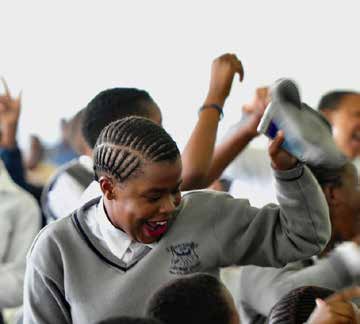
The national launch of the Sanitary Dignity Programme was held under the theme ‘Restoring the dignity of young women’.
The launch is a culmination of government’s efforts to ensure that all young women have access to sanitary products.
Cabinet took a decision in October 2017 that the sanitary dignity programme should first be piloted in KwaZulu-Natal, Eastern Cape and Mpumalanga and that would inform and guide the national roll-out process.
The National Sanitary Dignity Programme encompasses the entire value chain, from procurement and production to storage, distribution, and disposal of sanitary products.
The Department of Women is mandated with the responsibility to coordinate the development of an implementation framework on the distribution of sanitary products to girls and women.
Minister Dlamini said few countries in the world supply free sanitary pads to women and girls that cannot afford to access these products.
“South Africa is one of the leaders in this quest to ensure that women empowerment and gender equality is realised.”
She said if sanitary pads were not made available to women and girls, it would have an impact on the academic progress of a girl learners at school, while boys would progress without hindrance and that would perpetuate the prevailing feature of an unequal society.
Sanitary dignity pilot breaks cycle of poverty
 For Noluthando Mtshali, who is part of the KwaZulu-Natal pilot at Bhekabantu Secondary in Msinga, the provision of free sanitary towels was a financial relief to her family.
For Noluthando Mtshali, who is part of the KwaZulu-Natal pilot at Bhekabantu Secondary in Msinga, the provision of free sanitary towels was a financial relief to her family.
“I come from a poor family and free sanitary towels come as a financial relief to my parents and it means that I have no reason to miss school,” Mtshali said.
The 17-year old said pupils at her school used to be embarrassed at school when they were on their periods, as often the menstruation cycle would start without warning.
“Some girls don’t know when they will be menstruating as they don’t have the pre-warning period cramps. In such cases you can end up being stained if you do not have sanitary towels, which is why it is necessary at all times to have a sanitary towel in your backpack,” said Mtshali.
Bhekabantu Secondary School principal Malungelo Mntungwa said he had seen a marked improvement in the pass rate since the programme started.
He said he had also seen a substantial decrease in the number of absent pupils and those that drop out.
“The availability of the sanitary towels has helped us a great deal because attendance is now very good and pupils are more confident,” said Mntungwa.
Did you know?
- In 2017 Gauteng allocated R58 million towards sanitary products and other hygiene products, while KwaZulu-Natal allocated R20 million. The Free State, North West and Eastern Cape contributed R6 million, R2.2 million and R1.2 million, respectively.
- The Department of Women will in 2019/20 lead the coordination of the nationwide roll-out of the National Sanitary Dignity Programme in selected no-fee schools.
SAPS accounting clerk an everyday hero
SAPS accounting clerk an everyday hero UrsulaA 32-year-old SAPS employee goes well beyond the scope of his job to bring hope, happiness and healing to those in need.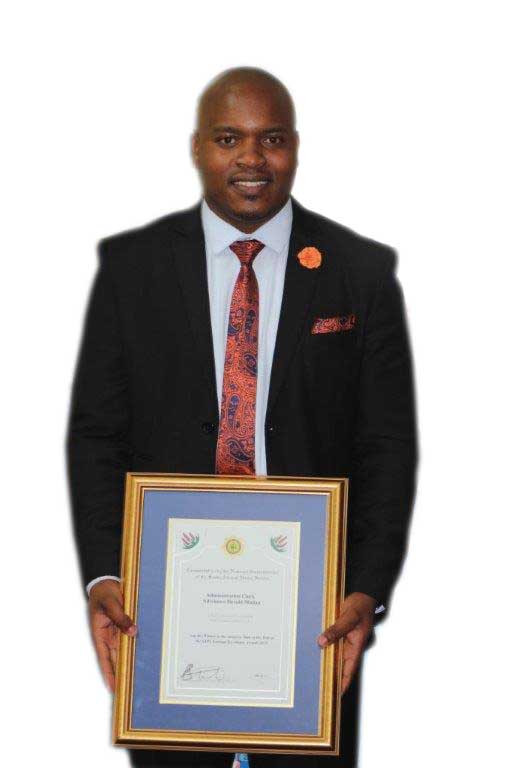
Ndivhuwo Herold Mudau is a member of the South African Police Service (SAPS) who does his country proud.
Over and above doing his job as an accounting clerk at the financial management and administration division of the SAPS head office in Pretoria, Mudau makes time to visit victims of violence and abuse, inmates, a centre for children living with disabilities and school children.
He recently received the Man of the Year Award during the annual SAPS National Excellence Awards 2019. He shared his excitement with Vuk’uzenzele.
“It is priceless to be recognised for doing something that you love. However, it also comes with a huge responsibility because there will be expectations for me to keep raising the bar and continue to do what I have been doing,” he said.
Mudau describes himself as a man who is strong-willed and spiritually rooted, and that is what drives him to do community service.
“We have a responsibility as human beings to help those in need. Being able to put a smile on someone’s face without expecting anything in return is what makes me sleep better at night,” he added.
The criteria for winning the award included showing evidence of being actively involved in community-outreach programmes and initiatives that touch the lives of ordinary citizens, outside the SAPS premises.
He is part of Women’s Network and Men for Change structures within the SAPS that carry out community-outreach programmes.
In addition, he implemented visits to inmates of the Heidelberg Correctional Centre, an idea inspired by his church, which regularly visits correctional centres to reconnect people with God.
“I introduced this idea to our SAPS structures because I felt that preaching was not enough. We visited Heidelberg Correctional Centre to spend time with inmates. Some of them never get visits from family members,” he explained.
“We also give them an opportunity to share their stories and talk about lessons that come with life in a correctional centre. We encourage them to be different members of society when they get released from prison and make them aware of possible challenges they may face, such as being stigmatised and having to earn trust,” he said.
Mudau said their structures also seek to achieve gender transformation, promote equal rights for men and women, and to advance the wellbeing of children and people living with disabilities.
He believes that the duty of members of the SAPS is to not only arrest criminals, but also to show society that they care.
SKA helps Northern Cape to reach for the stars
SKA helps Northern Cape to reach for the stars tsoanaThe South African site of the Square Kilometre Array (SKA), in the Northern Cape is one of the country’s biggest scientific projects.
 The project is providing skills training and work opportunities to thousands of people while also encouraging education in science and mathematics through various school outreach and university bursary programmes.
The project is providing skills training and work opportunities to thousands of people while also encouraging education in science and mathematics through various school outreach and university bursary programmes.
The South African Radio Astronomy Observatory (SARAO) manages the SKA under the Research and Development Foundation. One of its priorities is the skills development of young artisans at a training centre in the small town of Carnarvon.
The centre teaches skills such as fitting and turning, diesel mechanics, electrical installations, boiler-making, plumbing, Information Technology and carpentry.
Davan Hoorn is one of the young people who has benefitted from the artisan training programme. In 2017, he qualified to be a fitter and turner at the site of the SKA after passing his trade test.
Hoorn was raised in Atlantis, but moved to Carnarvon when he heard about the opportunities available with the SKA. Hoorn was raised in Atlantis, but moved to Carnarvon when he heard about the opportunities available with the SKA.
He first worked as part of a sub-contractor’s team and then received training to become a welder. Although he had some experience with engineering and electrical installations, he did not have a formal qualification.
“The artisan programme with SKA gave me the opportunity to qualify. I would like to use this qualification as a springboard to my dream of becoming a mechanical engineer,” says Hoorn.
The SKA is a global radio telescope project with 11 member countries. When completed, the telescopes will be able to explore the universe better than ever before. So far, the project in South Africa has created more than 7 200 jobs.
In terms of education, more than 1 000 students have received bursaries to study science and engineering at universities. Throughout the year, SARAO visits schools in the Northern Cape to help recruit mathematics and science teachers, equip science labs and encourage learning in science fields through events such as expos, competitions and field trips.
“SARAO is committed to working with the communities close by and are focused on investing in the youth, supporting community upliftment programmes, developing small to medium enterprises, nurturing learners’ talents, and
developing supplementary communications systems,” said SARAO Managing Director, Dr Rob Adam.
Adam also said of the R760 million spent on establishing infrastructure for the MeerKAT Radio Telescope, approximately R306 million was spent in the Northern Cape.
Spellbound by the magic of reading
Spellbound by the magic of reading UrsulaReading aloud to children daily gives them a head start in life.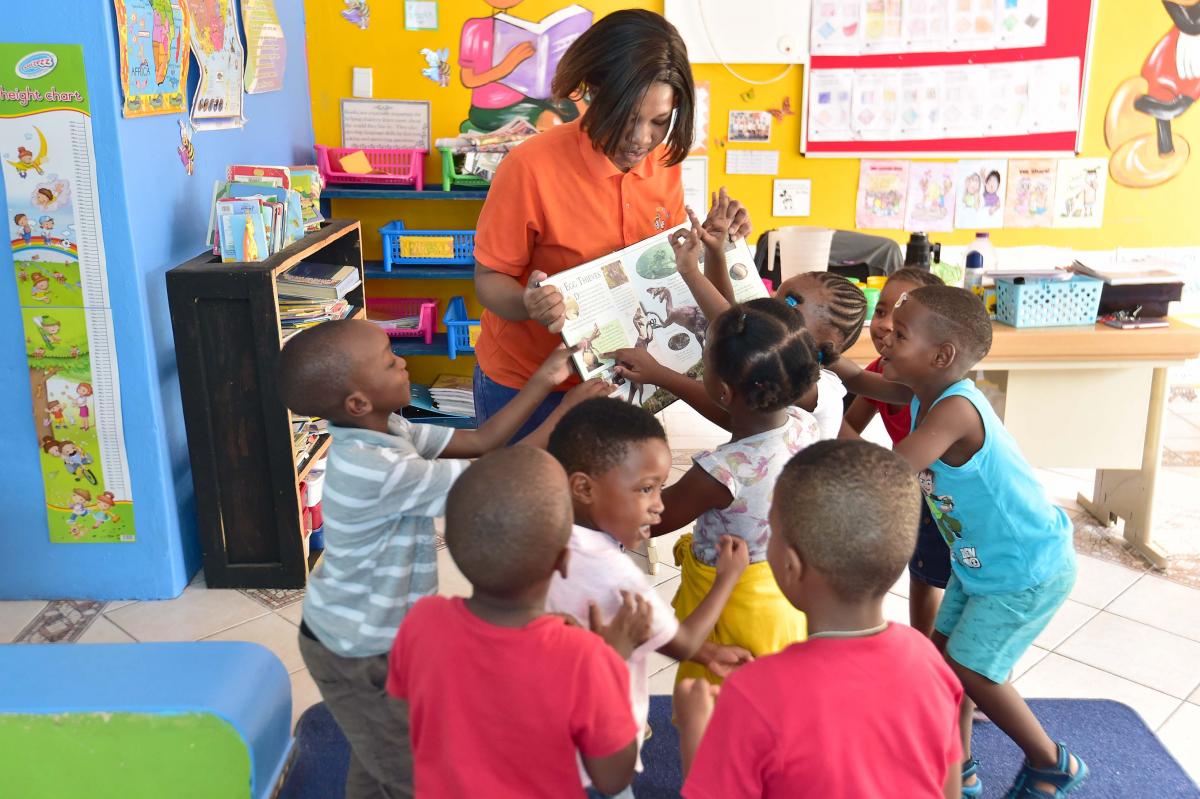
Reading to children paves the way for their success in adulthood, building important social, psychological and cognitive skills in ways that positively affect them and their communities.
The importance of reading has been highlighted by government, with President Cyril Ramaphosa’s State of the Nation Address prioritising the improvement of reading comprehension in early childhood education, and the Minister of Basic Education Angie Motshekga launching the National Reading Coalition.
The skill of reading, and reading for meaning, is learned at a young age and requires the efforts of parents, teachers and the community.
At the award-winning Kidz Fountain Day Care Centre in Norkem Park, Johannesburg, reading is an important part of the daily activities, and reading time is one of the most exciting parts of the day, said Grade R teacher Boniswa Khuse.
Khuse, who reads to the children once or twice a day, depending on the school schedule, has observed the power of reading in the development of her learners.
“Research has shown that children who are read to daily are a year ahead of those who are not being read to. Reading helps to increase their reading capacity and allows them to use their imaginations and tell stories. It also helps them build vocabulary, gives them the confidence to speak and improves their cognitive skills,” she said.
Khuse observed how reading to her learners has affected their ability to make sense of the world.
“I ask them questions in class, and I can hear from their answers that they are using reasoning learned from the stories we have read. For example, they know from Little Red Riding Hood that talking to strangers can get them into trouble. They are applying this logic in real life to solve problems.”
Her learners also display good behavioural and communication skills in class, because reading time had taught them to settle down quickly and talk using soft and loud voices inside and outside the classroom.
The learners at Kidz Fountain come from diverse backgrounds and speak different languages. Khuse said reading to them in English has improved their English-speaking abilities.
She encourages parents to read to their children at home.
“Parents should encourage their children and make reading a positive experience.”
The highs and lows of being bipolar
The highs and lows of being bipolar vuyelwanWhile there are various bipolar disorders, the main one, previously known as manic depression, is a mental health condition that causes extreme changes in mood from emotional highs (mania) to lows (depression), with periods of a normal mood in between.
Dr Eddie Pak, a psychiatrist based at the Gauteng Department of Health’s Sterkfontein Psychiatric Hospital in Krugersdorp, explains that it is perfectly normal for people to have different moods and to feel happy or sad, as various things happen in their life. 
“Bipolar disorder, however, is when someone experiences extreme mood changes, for no apparent reason. The changes tend to be episodic, last longer and interfere with daily life,” he says.
Bipolar symptoms
According to a guide to bipolar disorder produced by the South African Depression and Anxiety Group (SADAG), the symptoms of the manic phase include:
- Feeling excessively good and nothing can change their happiness;
- Extreme optimism;
- A lack of good judgement which puts patients at the risk of drug abuse and recklessness;
- Being hyperactive for days with little or no sleep;
- Changing from topic to topic in conversation, and speaking quickly and loudly;
- Becoming enraged for no reason or when someone suggests that their plans are unreasonable.
“If a manic episode is not treated in time, it could result in psychosis and the person could lose touch with reality. They can start believing things that are not real and become angry and aggressive. Manic episodes are easy for others to recognise, because they are so dramatic,” says Dr Pak.
These episodes are followed by severe depression, with the same symptoms as regular clinical or major depression which include the following feelings:
- Sadness
- Guilty or hopeless;
- Not wanting to get out of bed or wanting to sleep but often not being able to sleep;
- Having little energy and feeling weak and tired;
- Loss of appetite, loss of interest in activities and feeling worthless.
“A depressive episode can also lead to psychosis, where people lose touch with reality. In severe cases, they want to harm themselves and can become suicidal,” says Dr Pak.
The good news is that help is on hand. “If someone has been properly diagnosed, is on the correct treatment and the treatment is properly managed, they can lead a fully functioning life,” says Dr Pak. \
If you think that you or someone you love is suffering from a bipolar disorder, visit your closest mental health clinic, hospital or doctor as soon as possible.
Using technology to monitor service delivery
Using technology to monitor service delivery UrsulaImagine a computer programme that can predict service-delivery protests before they happen! Thanks to the digital age, tools such as these are becoming a reality.
Three young people are leading the charge of the 4IR.
The students have developed a technologically advanced dashboard that will assist government in ensuring efficient and effective service delivery.
A dashboard is an information management tool. It visualises, analyses and displays the data gathered.
It also uses statistics to collect data that will enable government to monitor service - delivery projects and identify delays. This will enable government to intervene in time to avert protests related to service delivery by members of communities.
One of the inventors of the technology, Zinzi Villo, who is a Master of Commerce in Information Systems candidate at the University of Cape Town, said the dashboard would allow for an increase in productivity, effectiveness and efficiency.
“What the dashboard does is visualise government departments' performance and gives one an idea of how each department is performing. Also showing how people are feeling about the service provided in different provinces. It also shows the budget allocated for each department,” Villo further explained.
Villo developed the dashboard in partnership with Thembela Daphula (22), a BSc Honours student in Data Science at the Sol Plaatje University, and Maria de Wet, a chemical engineering student at the University of Pretoria.
The students used data from Statistics South Africa, the Presidential Hotline, the South African Police Service, the South African Social Security Agency and the Department of Health. The Council for Scientific and Industrial Research (CSIR) supplied the students with software and hardware.
“We used Python programming language for coding and other libraries needed to get the project going,” said 33-year-old Villo.
The students came up with the concept after their project leader challenged them to use data to find solutions and create insights on structured and unstructured issues.
“Based on the data that we were given by our project leader, we decided to create a dashboard to visualise and understand data,” explained Villo.
The dashboard was created over an intense two-month period at the CSIR.
What will people say?
What will people say? tsoanaAdvertorial
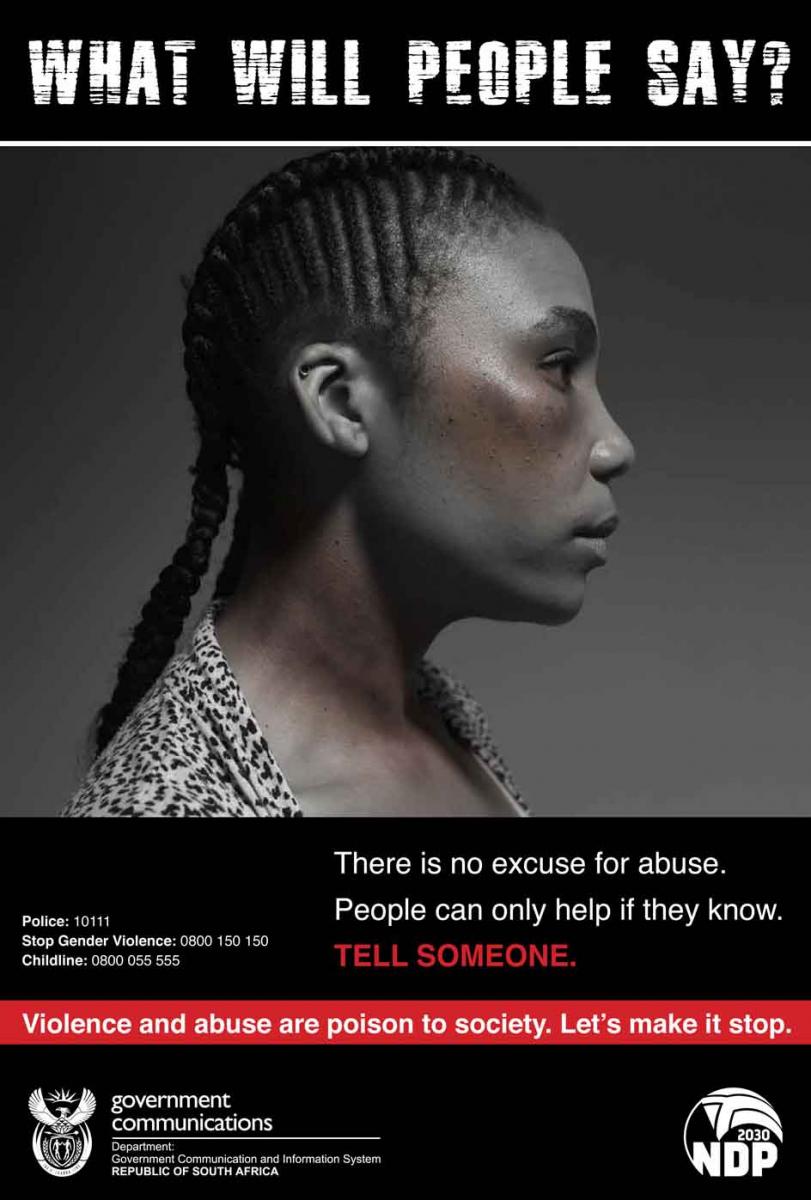
You have the power to stop climate change
You have the power to stop climate change vuyelwanGlobal warming is a reality that is no longer being denied but many people are still not informed on the issues relating to the environment.
There are many myths surrounding climate change and the importance of living green.
Lutfiyah Suliman, a Project Manager at the Wildlife & Environment Society of South Africa a non-governmental organisation advocating against pollution and global warming, says that people neglect the environment in different ways such as:
- poor natural resource extraction methods;
- the use of non- renewable resources which pollute land, air and water;
- wasteful production and consumption;
- poor waste disposal and creation of large amounts of waste materials which take many years to break down, such as plastic.
"The act of not taking care of our environment leads to climate change," Sulima said.
The effects of climate change vary affecting rainfall, the periods of seasons, the ability to plough in particular areas and seasons. 
“Climate change affects global weather patterns and results in extremes of temperature, especially extreme hot temperatures in places that previously did not experience such high temperatures,” she said.
Suliman said this was felt most by poorer communities, where the means to adapt to and resist these changes were not widespread.
According to the environmentalist, the situation can be remedied by actively seeking knowledge that can equip them to understand who and what is having a negative effect on the quality of the air, water and land around them,” she said.
Suliman told Vuk’uzenzele that the environment could be protected by “behavioural changes”. She said: “Being more conscious of consumption habits, buying less and reusing more, recycling where possible, and acting as a community to ensure environmental injustices are followed up on and resolved,” said Suliman.
She called on people to use the available resources such as buyback centres in order to reduce, reuse and recycle waste.